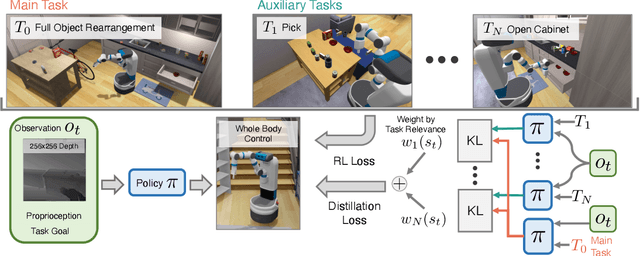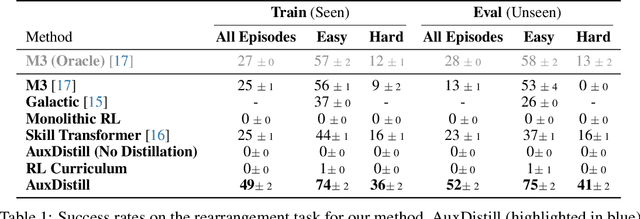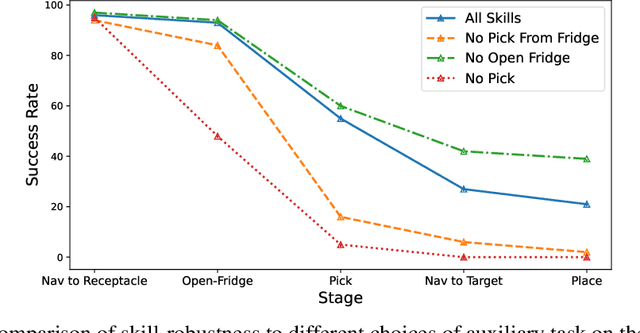Josiah P. Hanna
Demystifying the Paradox of Importance Sampling with an Estimated History-Dependent Behavior Policy in Off-Policy Evaluation
May 28, 2025Abstract:This paper studies off-policy evaluation (OPE) in reinforcement learning with a focus on behavior policy estimation for importance sampling. Prior work has shown empirically that estimating a history-dependent behavior policy can lead to lower mean squared error (MSE) even when the true behavior policy is Markovian. However, the question of why the use of history should lower MSE remains open. In this paper, we theoretically demystify this paradox by deriving a bias-variance decomposition of the MSE of ordinary importance sampling (IS) estimators, demonstrating that history-dependent behavior policy estimation decreases their asymptotic variances while increasing their finite-sample biases. Additionally, as the estimated behavior policy conditions on a longer history, we show a consistent decrease in variance. We extend these findings to a range of other OPE estimators, including the sequential IS estimator, the doubly robust estimator and the marginalized IS estimator, with the behavior policy estimated either parametrically or non-parametrically.
Multi-Robot Collaboration through Reinforcement Learning and Abstract Simulation
Mar 07, 2025



Abstract:Teams of people coordinate to perform complex tasks by forming abstract mental models of world and agent dynamics. The use of abstract models contrasts with much recent work in robot learning that uses a high-fidelity simulator and reinforcement learning (RL) to obtain policies for physical robots. Motivated by this difference, we investigate the extent to which so-called abstract simulators can be used for multi-agent reinforcement learning (MARL) and the resulting policies successfully deployed on teams of physical robots. An abstract simulator models the robot's target task at a high-level of abstraction and discards many details of the world that could impact optimal decision-making. Policies are trained in an abstract simulator then transferred to the physical robot by making use of separately-obtained low-level perception and motion control modules. We identify three key categories of modifications to the abstract simulator that enable policy transfer to physical robots: simulation fidelity enhancements, training optimizations and simulation stochasticity. We then run an empirical study with extensive ablations to determine the value of each modification category for enabling policy transfer in cooperative robot soccer tasks. We also compare the performance of policies produced by our method with a well-tuned non-learning-based behavior architecture from the annual RoboCup competition and find that our approach leads to a similar level of performance. Broadly we show that MARL can be use to train cooperative physical robot behaviors using highly abstract models of the world.
Reinforcement Learning Within the Classical Robotics Stack: A Case Study in Robot Soccer
Dec 12, 2024



Abstract:Robot decision-making in partially observable, real-time, dynamic, and multi-agent environments remains a difficult and unsolved challenge. Model-free reinforcement learning (RL) is a promising approach to learning decision-making in such domains, however, end-to-end RL in complex environments is often intractable. To address this challenge in the RoboCup Standard Platform League (SPL) domain, we developed a novel architecture integrating RL within a classical robotics stack, while employing a multi-fidelity sim2real approach and decomposing behavior into learned sub-behaviors with heuristic selection. Our architecture led to victory in the 2024 RoboCup SPL Challenge Shield Division. In this work, we fully describe our system's architecture and empirically analyze key design decisions that contributed to its success. Our approach demonstrates how RL-based behaviors can be integrated into complete robot behavior architectures.
Stable Offline Value Function Learning with Bisimulation-based Representations
Oct 02, 2024



Abstract:In reinforcement learning, offline value function learning is the procedure of using an offline dataset to estimate the expected discounted return from each state when taking actions according to a fixed target policy. The stability of this procedure, i.e., whether it converges to its fixed-point, critically depends on the representations of the state-action pairs. Poorly learned representations can make value function learning unstable, or even divergent. Therefore, it is critical to stabilize value function learning by explicitly shaping the state-action representations. Recently, the class of bisimulation-based algorithms have shown promise in shaping representations for control. However, it is still unclear if this class of methods can stabilize value function learning. In this work, we investigate this question and answer it affirmatively. We introduce a bisimulation-based algorithm called kernel representations for offline policy evaluation (KROPE). KROPE uses a kernel to shape state-action representations such that state-action pairs that have similar immediate rewards and lead to similar next state-action pairs under the target policy also have similar representations. We show that KROPE: 1) learns stable representations and 2) leads to lower value error than baselines. Our analysis provides new theoretical insight into the stability properties of bisimulation-based methods and suggests that practitioners can use these methods for stable and accurate evaluation of offline reinforcement learning agents.
Reinforcement Learning via Auxiliary Task Distillation
Jun 24, 2024



Abstract:We present Reinforcement Learning via Auxiliary Task Distillation (AuxDistill), a new method that enables reinforcement learning (RL) to perform long-horizon robot control problems by distilling behaviors from auxiliary RL tasks. AuxDistill achieves this by concurrently carrying out multi-task RL with auxiliary tasks, which are easier to learn and relevant to the main task. A weighted distillation loss transfers behaviors from these auxiliary tasks to solve the main task. We demonstrate that AuxDistill can learn a pixels-to-actions policy for a challenging multi-stage embodied object rearrangement task from the environment reward without demonstrations, a learning curriculum, or pre-trained skills. AuxDistill achieves $2.3 \times$ higher success than the previous state-of-the-art baseline in the Habitat Object Rearrangement benchmark and outperforms methods that use pre-trained skills and expert demonstrations.
Pretraining Decision Transformers with Reward Prediction for In-Context Multi-task Structured Bandit Learning
Jun 07, 2024



Abstract:In this paper, we study multi-task structured bandit problem where the goal is to learn a near-optimal algorithm that minimizes cumulative regret. The tasks share a common structure and the algorithm exploits the shared structure to minimize the cumulative regret for an unseen but related test task. We use a transformer as a decision-making algorithm to learn this shared structure so as to generalize to the test task. The prior work of pretrained decision transformers like DPT requires access to the optimal action during training which may be hard in several scenarios. Diverging from these works, our learning algorithm does not need the knowledge of optimal action per task during training but predicts a reward vector for each of the actions using only the observed offline data from the diverse training tasks. Finally, during inference time, it selects action using the reward predictions employing various exploration strategies in-context for an unseen test task. Our model outperforms other SOTA methods like DPT, and Algorithmic Distillation over a series of experiments on several structured bandit problems (linear, bilinear, latent, non-linear). Interestingly, we show that our algorithm, without the knowledge of the underlying problem structure, can learn a near-optimal policy in-context by leveraging the shared structure across diverse tasks. We further extend the field of pre-trained decision transformers by showing that they can leverage unseen tasks with new actions and still learn the underlying latent structure to derive a near-optimal policy. We validate this over several experiments to show that our proposed solution is very general and has wide applications to potentially emergent online and offline strategies at test time. Finally, we theoretically analyze the performance of our algorithm and obtain generalization bounds in the in-context multi-task learning setting.
SaVeR: Optimal Data Collection Strategy for Safe Policy Evaluation in Tabular MDP
Jun 04, 2024



Abstract:In this paper, we study safe data collection for the purpose of policy evaluation in tabular Markov decision processes (MDPs). In policy evaluation, we are given a \textit{target} policy and asked to estimate the expected cumulative reward it will obtain. Policy evaluation requires data and we are interested in the question of what \textit{behavior} policy should collect the data for the most accurate evaluation of the target policy. While prior work has considered behavior policy selection, in this paper, we additionally consider a safety constraint on the behavior policy. Namely, we assume there exists a known default policy that incurs a particular expected cost when run and we enforce that the cumulative cost of all behavior policies ran is better than a constant factor of the cost that would be incurred had we always run the default policy. We first show that there exists a class of intractable MDPs where no safe oracle algorithm with knowledge about problem parameters can efficiently collect data and satisfy the safety constraints. We then define the tractability condition for an MDP such that a safe oracle algorithm can efficiently collect data and using that we prove the first lower bound for this setting. We then introduce an algorithm SaVeR for this problem that approximates the safe oracle algorithm and bound the finite-sample mean squared error of the algorithm while ensuring it satisfies the safety constraint. Finally, we show in simulations that SaVeR produces low MSE policy evaluation while satisfying the safety constraint.
Adaptive Exploration for Data-Efficient General Value Function Evaluations
May 13, 2024Abstract:General Value Functions (GVFs) (Sutton et al, 2011) are an established way to represent predictive knowledge in reinforcement learning. Each GVF computes the expected return for a given policy, based on a unique pseudo-reward. Multiple GVFs can be estimated in parallel using off-policy learning from a single stream of data, often sourced from a fixed behavior policy or pre-collected dataset. This leaves an open question: how can behavior policy be chosen for data-efficient GVF learning? To address this gap, we propose GVFExplorer, which aims at learning a behavior policy that efficiently gathers data for evaluating multiple GVFs in parallel. This behavior policy selects actions in proportion to the total variance in the return across all GVFs, reducing the number of environmental interactions. To enable accurate variance estimation, we use a recently proposed temporal-difference-style variance estimator. We prove that each behavior policy update reduces the mean squared error in the summed predictions over all GVFs. We empirically demonstrate our method's performance in both tabular representations and nonlinear function approximation.
On-Policy Policy Gradient Reinforcement Learning Without On-Policy Sampling
Nov 14, 2023Abstract:On-policy reinforcement learning (RL) algorithms perform policy updates using i.i.d. trajectories collected by the current policy. However, after observing only a finite number of trajectories, on-policy sampling may produce data that fails to match the expected on-policy data distribution. This sampling error leads to noisy updates and data inefficient on-policy learning. Recent work in the policy evaluation setting has shown that non-i.i.d., off-policy sampling can produce data with lower sampling error than on-policy sampling can produce. Motivated by this observation, we introduce an adaptive, off-policy sampling method to improve the data efficiency of on-policy policy gradient algorithms. Our method, Proximal Robust On-Policy Sampling (PROPS), reduces sampling error by collecting data with a behavior policy that increases the probability of sampling actions that are under-sampled with respect to the current policy. Rather than discarding data from old policies -- as is commonly done in on-policy algorithms -- PROPS uses data collection to adjust the distribution of previously collected data to be approximately on-policy. We empirically evaluate PROPS on both continuous-action MuJoCo benchmark tasks as well as discrete-action tasks and demonstrate that (1) PROPS decreases sampling error throughout training and (2) improves the data efficiency of on-policy policy gradient algorithms. Our work improves the RL community's understanding of a nuance in the on-policy vs off-policy dichotomy: on-policy learning requires on-policy data, not on-policy sampling.
Multi-task Representation Learning for Pure Exploration in Bilinear Bandits
Nov 01, 2023Abstract:We study multi-task representation learning for the problem of pure exploration in bilinear bandits. In bilinear bandits, an action takes the form of a pair of arms from two different entity types and the reward is a bilinear function of the known feature vectors of the arms. In the \textit{multi-task bilinear bandit problem}, we aim to find optimal actions for multiple tasks that share a common low-dimensional linear representation. The objective is to leverage this characteristic to expedite the process of identifying the best pair of arms for all tasks. We propose the algorithm GOBLIN that uses an experimental design approach to optimize sample allocations for learning the global representation as well as minimize the number of samples needed to identify the optimal pair of arms in individual tasks. To the best of our knowledge, this is the first study to give sample complexity analysis for pure exploration in bilinear bandits with shared representation. Our results demonstrate that by learning the shared representation across tasks, we achieve significantly improved sample complexity compared to the traditional approach of solving tasks independently.
 Add to Chrome
Add to Chrome Add to Firefox
Add to Firefox Add to Edge
Add to Edge